
National Institute for Basic Biology

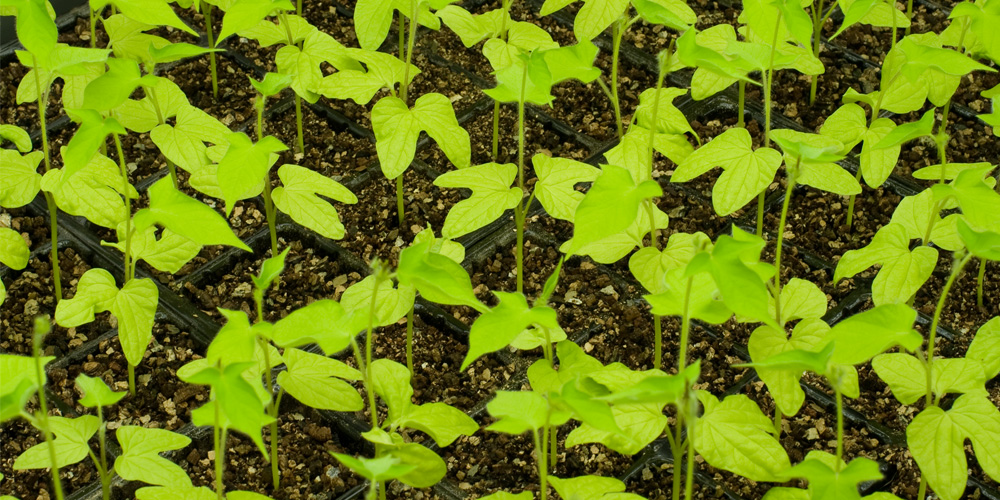


| Organizers | Masayoshi Kawaguchi(NIBB) Yoshikatsu Matsubayashi (NIBB) Kiyoshi Tatematsu (NIBB) Mitsuyasu Hasebe (NIBB) Mikio Nishimura (NIBB) |
|---|---|
| Venue | Okazaki Conference Center, Okazaki, Japan |
| Date | Nov. 19-21, 2012 |
| Link | Symposium Website (http://www.nibb.ac.jp/joint2012/) |
| Poster |
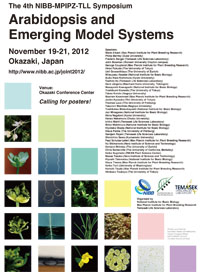
|
The National Institute for Basic Biology (NIBB), with the goal of advancing research and providing a venue for academic exchange, held the 4th NIBB-MPIPZ-TLL joint symposium from November 19th ~ November 21st 2012, at the Okazaki Conference Center in Okazaki City, Aichi Prefecture, Japan. This series of symposia began in Cologne in 2009, as a joint venture between NIBB and The Max Planck Institute for Plant Breeding Research (MPIPZ), with which NIBB has formed an academic exchange agreement, the Temasek Life Science Laboratory, which also entered into an academic exchange agreement with NIBB, later joined. The symposia are now being held in rotation between all three institutes. The theme for this year's conference was “Arabidopsis and Emerging Model Systems”. Arabidopsis is well known as an excellent model organism, playing a central role in the elucidation of the molecular mechanisms involved in development, physiology, environmental response, and other biological processes. For this year's symposium, we invited many researchers on the forefront of the field to present their research results and engage in lively discourse regarding their work. Notably, Okazaki is known as one of the founding centers of the Arabidopsis community in Japan. In 1990 and 1991, Dr. Kiyotaka Okada, (at the time, an assistant professor at the Dr. Yoshiro Shimura’s Lab of NIBB) planned and held the first and second workshops promoting Arabidopsis as a model organism in NIBB, after which its use within Japan rapidly expanded. However, just like the world of animals or microbes, the world of plants is quite diverse. Many biological phenomena remain which cannot be understood or elucidated through Arabidopsis, and even whether the insights into plant biology provided by Arabidopsis are universal remains unknown. In addition, with recent years bringing revolutions in next generation sequencer technology and genetic analysis techniques, new model lines continue to spring forth at a rapid pace. Thus, at this symposium, we also asked for the participation of researchers engaged in dynamic research utilizing new model plants such as Marchantia Polymorpha, seaweed, algae, or other experimental lines in order to further mutual understanding of research new and old. This year marks the final year of General Director Okada's tenure at NIBB, and a quarter century of his work in the field of plant biology. The symposium was a lively one, thanks not only to the researchers engaged in pushing forward the state of plant research while expanding the Arabidopsis community, but also thanks to the researchers connected to NIBB, and internationally active women researchers, who were kind enough to take part in this symposium. There was a total of 186 participants, with 67 poster presentations of new research, primarily featuring the work of younger researchers, on exhibit as well. With question and answer sessions running on into lengthy, animated discussions, the 4th NIBB-MPIPZ-TLL joint symposium was a wonderful experience for all.
Organizer: Masayoshi Kawaguchi (NIBB)
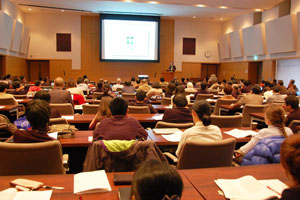
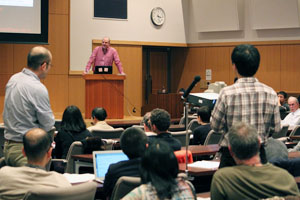
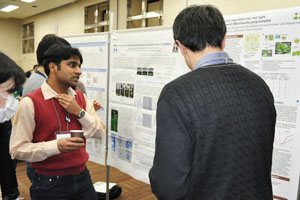
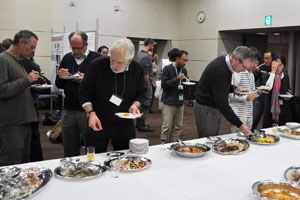
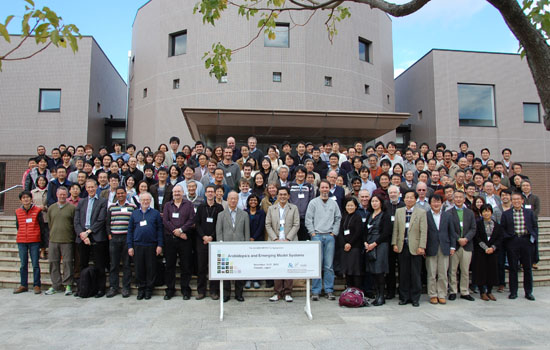
| November 19th, Monday at the Okazaki Conference Center (OCC) | |
| 8:45 | Registration |
| 09:15 - 09:25 | Opening Remarks |
| Masayoshi Kawaguchi (National Institute for Basic Biology, Japan) | |
| Session 1 | |
| Chair: Kiyoshi Tatematsu | |
| 09:25 - 10:05 | “Development rooted in emergent properties of regulatory networks” |
| Philip Benfey (Duke University, USA) | |
| 10:05 - 10:30 | “Plant vascular stem cell fates controlled by a CLE peptide and brassinosteroid” |
| Hiroo Fukuda (The University of Tokyo, Japan) | |
| 10:30 - 10:45 | Coffee Break |
| Session 2 | |
| Chair: Shoji Mano | |
| 10:45 - 11:15 | “Arabidopsis Natural Variation: Epistasis Reveals A New Function For An Old Gene” |
| Maarten Koornneef (Max Planck Institute for Plant Breeding Research, Germany) | |
| 11:15 - 11:40 | “Transcriptional repression of seed maturation genes after seed germination in Arabidopsis thaliana” |
| Kenzo Nakamura (Chubu University, Japan) | |
| 11:40 - 12:00 | “Dynamics of Peroxisomes in Arabidopsis” |
| Mikio Nishimura (National Institute for Basic Biology, Japan) | |
| 12:00 - 13:30 | Lunch & Poster Session |
| Session 3 | |
| Chair: Takuya Suzaki | |
| 13:30 - 14:10 | “Insights from multiscale analysis of signalling networks in Arabidopsis thaliana” |
| Klaus Palme (The University of Freiburg, Germany) | |
| 14:10 - 14:35 | “ER-family genes involved in many processes of aerial morphogenesis” |
| Masao Tasaka (Nara Institute of Science and Technology, Japan) | |
| 14:35 - 15:00 | “Pedicel and internodal development in the inflorescence of Arabidopsis thaliana” |
| Yoshibumi Komeda (The University of Tokyo, Japan) | |
| 15:00 - 15:25 | Coffee Break |
| Session 4 | |
| Chair: Yosuke Tamada | |
| 15:25 - 16:05 | “Molecular Control of Fertilization and Interspecific Crossing Barriers in Arabidopsis thaliana” |
| Ueli Grossniklaus (The University of Zurich, Switzerland) | |
| 16:05 - 16:35 | “Epigenetic reprogramming during sexual reproduction in plants” |
| Frederic Berger (Temasek Life Sciences Laboratory, Singapore) | |
| 16:35 - 17:00 | “Polyploid model species of Arabidopsis and Cardamine: recurrent patterns in the evolution of selfing and polyploid speciation” |
| Kentaro Shimizu (The University of Zurich, Switzerland) | |
| 17:00 - 17:20 | Coffee Break |
| Session 5 | |
| Chair: Hidefumi Shinohara | |
| 17:20 - 17:45 | “ANGUSTIFOLIA3 governs “leaf” programs in Arabidopsis” |
| Hirokazu Tsukaya (The University of Tokyo, Japan) | |
| 17:45 - 18:10 | “ASYMMETRIC LEAVES2 (AS2)/AS1 is a developmental stabilizer for the leaf formation in Arabidopsis” |
| Yasunori Machida (Nagoya University, Japan) | |
| 18:10 - 18:30 | “Primary Transcript Of MIR165A Is Necessary To Determine The miR165 Active Region In Arabidopsis Leaf Primorida” |
| Kiyoshi Tatematsu (National Institute for Basic Biology, Japan) | |
| November 20 (Tue) at OCC | |
| Session 6 | |
| Chair: Masaki Ishikawa | |
| 09:00 - 09:40 | “Novel pathways in Arabidopsis shoot meristem stem cell maintenance” |
| Thomas Laux (The University of Freiburg, Germany) | |
| 09:40 - 10:05 | “TAWAWA1, a molecular link between yield and meristem phase transition in rice inflorescence development” |
| Junko Kyozuka (The University of Tokyo, Japan) | |
| 10:05 - 10:30 | “Shoot Architecture and Leaf Dissection in Tomato Are Regulated by Homologous Gene Modules” |
| Klaus Theres (Max Planck Institute for Plant Breeding Research, Germany) | |
| 10:30 - 10:50 | Coffee Break |
| Session 7 | |
| Chair: Takashi Murata | |
| 10:50 - 11:15 | “How does cotyledonous phytochrome control hypocotyl elongation with a long time lag?” |
| Akira Nagatani (Kyoto University, Japan) | |
| 11:15 - 11:35 | “Supercomplexes and Super-supercomplex in Photosynthesis” |
| Jun Minagawa (National Institute for Basic Biology, Japan) | |
| 11:35 - 12:00 | “Design of circadian clock: harmonic oscillation as the pacemaker and relaxation oscillation as a rhythm driver installed in the clock protein KaiC” |
| Takao Kondo (Nagoya University, Japan) | |
| 12:00 - 12:10 | Group photo |
| 12:10 - 13:30 | Lunch & Poster Session |
| Session 8 | |
| Chair: Makoto Hayashi | |
| 13:30 - 14:10 | “HOW TO MAKE-UP LEAF FACES--The adaxial-abaxial polarity-dependent development of leaves--” |
| Kiyotaka Okada (National Institute for Basic Biology, Japan) | |
| 14:10 - 14:50 | “EVOLUTION OF BODY PLANS IN LAND PLANTS” |
| John Bowman (Monash University Clayton campus, Australia) | |
| 14:50 - 15:15 | “Communication, Fate, and Decision Making during Stomatal Development” |
| Keiko Torii (University of Washington, USA) | |
| 15:15 - 15:40 | Coffee Break |
| Session 9 | |
| Chair: Atsushi Hoshino | |
| 15:40 - 16:10 | “CONTROL OF FLORAL INDUCTION IN RELATED ANNUAL AND PERENNIAL PLANTS” |
| George Coupland (Max Planck Institute for Plant Breeding Research, Germany) | |
| 16:10 - 16:35 | “Molecular Biology of Florigen” |
| Ko Shimamoto (Nara Institute of Science and Technology, Japan) | |
| 16:35 - 17:00 | “Perfect Ending of Floral Meristems” |
| Toshiro Ito (Temasek Life Sciences Laboratory, Singapore) | |
| 17:00 - 17:20 | Coffee Break |
| Session 10 | |
| Chair: Naoya Takeda | |
| 17:20 - 18:00 | “Plant cytokinesis – a tale of membrane traffic and fusion” |
| Gerd Jürgens (Eberhard Karls University of Tübingen, Germany) | |
| 18:00 - 18:25 | “Developmental Control of Plant Cell Growth |
| Keiko Sugimoto (RIKEN Plant Science Center, Japan) | |
| 18:25 - 18:45 | “Secreted Peptide Signals Required for Maintenance of Root Stem Cell Niche in Arabidopsis” |
| Yoshikatsu Matsubayashi (National Institute for Basic Biology, Japan) | |
| 19:00 - 21:00 | Dinner & Poster Session |
| November 21 (Wed) at OCC | |
| Session 11 | |
| Chair: Kenji Yamada | |
| 09:00 - 09:40 | “The Development of Cellulosic Biofuels” |
| Chris Somerville (The University of California, Berkeley, USA) | |
| 09:40 - 10:05 | “Develop Plant Systems For The Sustainable Production Of Valuable Chemicals” |
| Rajani Sarojam (Temasek Life Sciences Laboratory, Singapore) | |
| 10:05 - 10:30 | “Endomembrane systems responsible for plant immunity” |
| Ikuko Hara-Nishimura (Kyoto University, Japan) | |
| 10:30 - 10:50 | Coffee Break |
| Session 12 | |
| Chair: Kazuo Tsugane | |
| 10:50 - 11:15 | “Cellular and evolutionary mechanism of morphogenesis in volvocine algae” |
| Ichiro Nishii (Temasek Life Sciences Laboratory, Singapore) | |
| 11:15 - 11:40 | “Arabis alpina as a Model to Study Life-history Evolution within the Brassicaceae” |
| Maria Albani (Max Planck Institute for Plant Breeding Research, Germany) | |
| 11:40 - 12:00 | “Carnivorous plant genome and the evolution of digestive enzymes and pitcher leaves” |
| Mitsuyasu Hasebe (National Institute for Basic Biology, Japan) | |
| 12:00 - 13:30 | Lunch |
| Session 13 | |
| Chair: Masanao Sato | |
| 13:30 - 13:50 | “Long-Distance Control of Symbiotic Organ Development” |
| Masayoshi Kawaguchi (National Institute for Basic Biology, Japan) | |
| 13:50 - 14:15 | “Comprehensive genetic analysis of CLV3 downstream pathway, and CLE peptide function in root knot nematode infection” |
| Shinichiro Sawa (Kumamoto University, Japan) | |
| 14:15 - 14:40 | “Network Properties and Structures of Plant Immunity” |
| Kenichi Tsuda (Max Planck Institute for Plant Breeding Research, Germany) | |
| 14:40 - 15:10 | “Structure and functions of the bacterial root microbiota in Arabidopsis” |
| Paul Schulze-Lefert (Max Planck Institute for Plant Breeding Research, Germany) | |
| 15:10 - 15:20 | Closing Remarks |
| Paul Schulze-Lefert (Max Planck Institute for Plant Breeding Research, Germany) | |
| 15:30 - 17:00 | Mixer at the entrance hall |